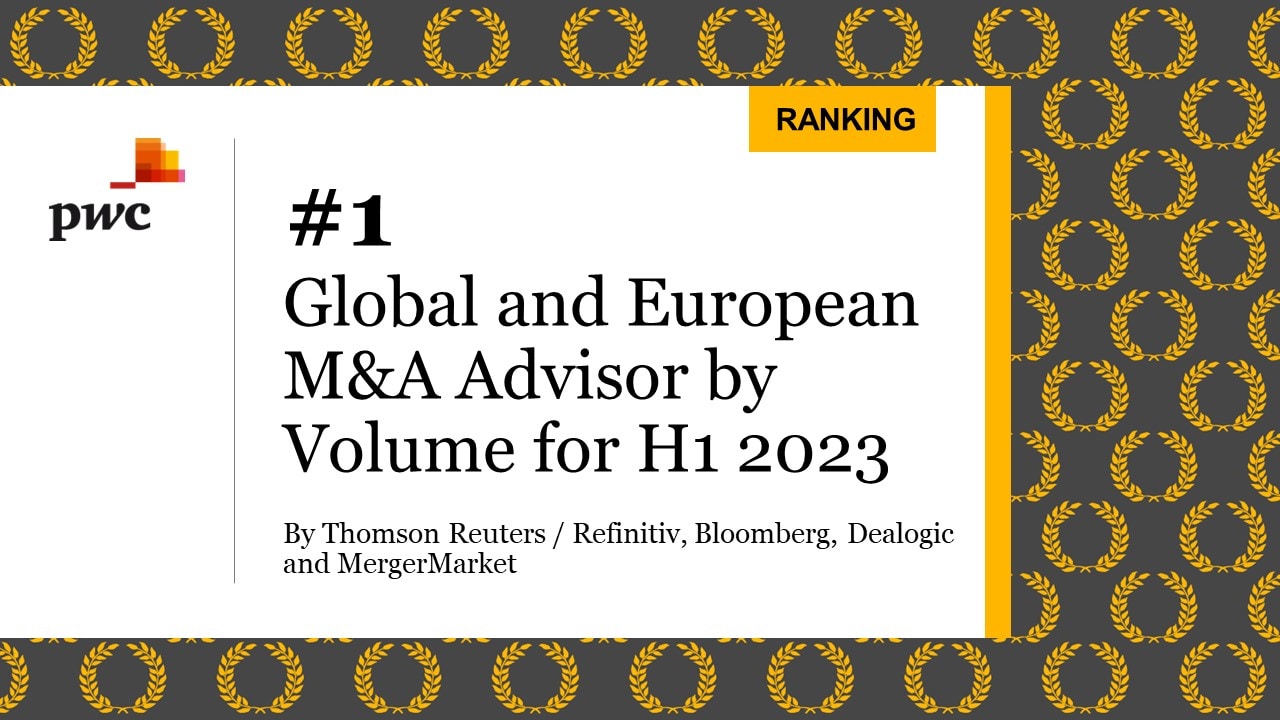
Swiss M&A Trends 2025 Outlook
Explore key M&A trends, from AI-driven transformation to rising capital availability and a surge in market assets. Learn more about the latest developments.

By Michael Huber
Director, Deals Industrial, Manufacturing & Automotive, PwC Switzerland
For the remainder of 2023, transactions in the industrial manufacturing & automotive (IM&A) sector are expected to proceed at a steady pace, mirroring the trends seen in the first half of the year. Both buyers and sellers are identifying opportunities, undeterred by the global macroeconomic landscape. CEOs who are well prepared and have a carefully planned M&A strategy will be best positioned to capitalise on deal opportunities, driving value and sustainable results as the market recovers.
M&A activity declined in 2022, due to the war in Ukraine, recession concerns, inflation, energy costs, and rising interest rates. At the beginning of 2023, we were cautiously optimistic that industrial manufacturing and automotive (IM&A) companies with strong balance sheets and sector-focused private equity buyers still sitting on a lot of dry powder would continue to pursue deals. We stand by this assessment and expect M&A activity to remain stable and companies to be able to create long-term value through strategic acquisitions. Thereby, dealmakers are clearly focusing their efforts on mid-market opportunities, as these deals are often easier to stomach compared to large deals.
Adverse macroeconomic and geopolitical factors continue to influence business performance and future growth estimates. This has led to a resurgence of fundamental strategies in deal-making, with heightened scrutiny being applied as all parties seek to minimise potential risks.
Challenging market conditions are prompting emphasis on strategic reviews which reveal gaps in technology and capabilities. To fill these gaps, firms are considering acquisitions in areas like AI, cybersecurity, and data analytics. Such deals also help reduce supply chain uncertainties, address environmental, social and governance (ESG) goals, and provide opportunities for value creation.
In response to market dynamics, companies are evaluating their portfolios to decide if selling non-core assets could fund strategic investments. Sellers aim to enhance portfolios for growth and profitability, viewing strategic divestitures as ways to optimise current capital allocation and reinvest in new market segments. As soon as the uncertainty in the global markets subsides, the pace of deal activity – particularly in the large-cap segment – should pick up.
“We expect M&A activity to remain stable and companies to be able to create long-term value through strategic acquisitions. Thereby, dealmakers are clearly focusing their efforts on mid-market opportunities, as these deals are often easier to stomach compared to large deals.”
Michael HuberDirector, Deals Industrial, Manufacturing & Automotive, PwC Switzerland
Our PwC Corporate Finance team has ranked as the Global and European #1 M&A Advisor by Volume for H1 2023 by Thomson Reuters/ Refinitiv, Bloomberg, Dealogic and MergerMarket
Global automotive M&A deal volumes dropped about 4% in the first half of 2023 compared to the second half of 2022, but deal values remained steady, largely due to the proposed US$23bn acquisition of VinFast Auto, a Vietnamese EV company, by a Hong Kong-based special purpose acquisition company. Without this megadeal, deal value would have been 40% lower, indicating a shift to smaller deal sizes due to financing challenges. In the first half of 2023, dealmakers kept discipline in capital usage, similar to 2022, making strategic decisions due to macroeconomic pressures, while benefitting from reduced margin volatility as some commodities and logistical costs stabilised.
M&A continues to be a strategic focus in the automotive sector due to the need for digital, software, and electrification advancements. The growing role of services in the auto industry also creates investment opportunities for OEMs in start-ups and emerging companies. Deal volumes are likely to stay stable as companies prepare for the electric future, investing in EVs and CASE (connected automated shared electric) assets, minimising supply chain disruptions, and consolidating scale through M&A. Acquisitions may also help companies meet ESG goals and comply with carbon emission regulations. Last but not least, the automotive supply segment is facing challenges as OEMs need to deal with unstable demand and manage their inventories accordingly, resulting in heightened pressure on the Tier-1 and Tier-2 supplier side and fuelling distressed M&A.
Industrial manufacturing businesses need to adopt new technologies to stay competitive amidst changing supply chains and market expectations. Through 2023, acquisitions targeting firms with data analytics, AI, and IoT capabilities are expected to drive M&A activity. Companies will likely continue divesting non-core assets for strategic alignment and capital release, with an increased focus on ESG initiatives. Post-deal activities will be more strategic to maximise acquired value.
Germany is Switzerland's most important trading partner, accounting for a significant share of total exports in product groups such as machinery, electrical and electronic equipment, technical apparatus, and a wide range of metal products. With our northern neighbour being at risk of slipping back into recession, Switzerland's industrial sector is also facing headwinds. While sales were still relatively strong in the first half of the year, production, order backlogs, and new orders are weakening, which will impact the financial performance of many industrial companies in the coming months. As a result, some players will be more cautious about M&A, focusing on cash conservation and their ongoing operations, while others will take advantage of the situation and pursue deals in an environment where they may temporarily face less competition.
TE Connectivity's recently launched public tender offer for Schaffner Group, which offers a significant premium to Schaffner shareholders willing to trade their shares, is a good example of a strategic deal that is still happening despite the uncertain market environment. Swiss industrial companies with a strong technology offering, often positioned in very specific niche markets, remain high on many investors' agendas, which is likely to enable both carve-out deals by Swiss industrial companies to streamline their portfolios and thus divest assets that are no longer seen as part of their core offering, as well as further takeover attempts such as the Schaffner/TE example.
We expect Swiss M&A activity over the next 6-9 months to be characterised by cash-rich buyers taking advantage of attractive valuation levels and opportunities arising from strategic portfolio reviews, as well as anchor investors reviewing their future role in their companies. Overall, there is still appetite for high-quality industrial assets, but we expect deals to happen in the more manageable mid-market. Investors may also focus on bolt-on deals, which tend to be smaller in size and have a lower risk profile.
“We expect Swiss M&A activity over the next 6-9 months to be characterised by cash-rich buyers taking advantage of attractive valuation levels and opportunities arising from strategic portfolio reviews, as well as anchor investors reviewing their future role in their companies.”
Michael HuberDirector, Deals Industrial, Manufacturing & Automotive, PwC SwitzerlandThe pursuit of new technologies, the need to safeguard supply chains, and the focus on improving ESG credentials are driving M&A activitiy in the industrial manufacturing and automotive sectors. We expect an uptick in deal activity as soon as market uncertainties subside and dealmakers pivot to strategic transactions, divestments, and transformational deals for value creation.
In the short term, we expect the current rate of transactions to remain steady, with mid-market deals being the clear driver of deal activity. Transactions in business services and tech-driven deals may continue to stimulate high multiples and competitive auctions. Ongoing financing difficulties may curb PEs’ enthusiasm for large transactions in the second half of 2023, and sizable IPOs are unlikely to ensure investor confidence in the public market.
CEOs with a well-thought-out and holistic M&A strategy will be able to selectively seize opportunities and thus create long-term value.

Explore key M&A trends, from AI-driven transformation to rising capital availability and a surge in market assets. Learn more about the latest developments.

Find out what’s going on in the EU&R space and how decarbonisation is driving the game.

Find out how generative AI and other emerging technologies are shaping deal activity in the TMT sector.

Find out why divestment of non-core assets is driving M&A activity in the financial services sector.
